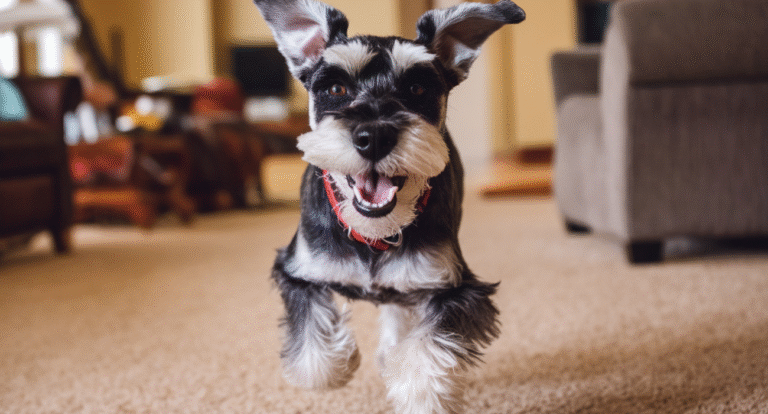Schnauzers have a reputation for noise. Find out whether they really are the noisiest breed and why.
You’re sitting peacefully on your couch when suddenly your Schnauzer erupts into a barking frenzy at… well, you’re not entirely sure what. A leaf? A shadow? The sheer audacity of the mailman existing? If this sounds familiar, you’re not alone. Schnauzer owners everywhere know that their bearded buddies have opinions, and they’re not afraid to voice them.
But does all that vocalization actually make Schnauzers the noisiest breed out there? The answer might surprise you. While these dogs certainly have a reputation for being chatty, the reality is more nuanced than you’d think.
The Schnauzer’s Natural Instincts
Understanding why Schnauzers bark so much starts with understanding what they were bred to do. These dogs weren’t designed to be quiet lap warmers. Originally, Schnauzers worked as ratters and guard dogs on German farms, where their job literally required them to sound the alarm. When you look at it this way, your Schnauzer isn’t being obnoxious; they’re just doing what centuries of breeding taught them to do.
The three Schnauzer varieties (Miniature, Standard, and Giant) all share this guarding heritage. Even the smallest Mini Schnauzer carries the soul of a much larger protector, ready to alert you to any potential “threats” (which, let’s face it, might include the neighbor’s cat or a plastic bag blowing down the street). This hardwired alertness means that Schnauzers are naturally predisposed to vocalize more than breeds developed for quieter work.
Their intelligence also plays a role. Schnauzers are smart—sometimes too smart for their own good. They’re quick to notice changes in their environment and even quicker to let you know about them. This combination of watchdog instincts and sharp minds creates a dog that’s constantly monitoring their surroundings and reporting their findings… loudly.
How Schnauzers Compare to Other Vocal Breeds
Here’s where things get interesting. While Schnauzers are definitely chatty, they’re far from alone in the vocal department. Let’s look at how they stack up against other breeds known for their noise levels:
| Breed | Barking Tendency | Volume Level | Reason for Vocalization |
|---|---|---|---|
| Schnauzer | High | Medium to High | Guarding instinct, alertness |
| Beagle | Very High | Very High | Hunting heritage, baying |
| Chihuahua | Very High | Medium | Territorial behavior, anxiety |
| Husky | Very High | Very High | Communication, pack mentality |
| Basset Hound | High | Very High | Hunting instinct, baying |
| Yorkshire Terrier | Very High | Medium | Terrier instinct, guarding |
| Dachshund | High | High | Hunting background, alertness |
As you can see, Schnauzers have plenty of competition in the noise department. Beagles and Huskies, in particular, are often considered more vocal than Schnauzers. Beagles have that distinctive bay that can carry for miles, while Huskies are famous for their dramatic vocalizations that sound eerily like human conversation (or arguments, depending on the situation).
The difference between a noisy breed and a problematic barker often comes down to training, environment, and understanding why the dog is vocalizing in the first place.
Why Your Schnauzer Won’t Stop Barking
Not all Schnauzer barking is created equal. These dogs bark for various reasons, and identifying the why behind the noise is crucial for addressing it. Here are the most common triggers:
Territorial Barking
This is the big one. When someone approaches your home, your Schnauzer feels compelled to let everyone within a five-mile radius know. This type of barking is deep, persistent, and comes with a healthy dose of “I mean business” attitude.
Boredom and Attention Seeking
A bored Schnauzer is a noisy Schnauzer. These intelligent dogs need mental stimulation, and if they’re not getting it, they’ll create their own entertainment (usually in the form of barking at nothing in particular). Similarly, if barking has successfully gotten your attention in the past, congratulations—you’ve trained your Schnauzer to bark for attention.
Anxiety or Fear
Some Schnauzers develop anxious barking habits, especially if they’re left alone frequently or haven’t been properly socialized. This type of vocalization often sounds different from territorial barking; it’s more frantic and may include whining.
Excitement
Let’s not forget the happy barking! Schnauzers often vocalize when they’re excited about walks, meals, or your return home. While this type of barking is usually brief, it can still be impressively loud.
Lack of Exercise
A tired Schnauzer is a quiet Schnauzer. These energetic dogs need regular physical activity, and without it, they’ll channel that energy into vocalizing instead.
Training Away the Noise
Here’s the good news: Schnauzers are highly trainable. Their intelligence, while sometimes working against quiet households, can absolutely be channeled into more peaceful behavior. The key is consistency and understanding that you’re working against centuries of breeding, so patience is essential.
Training a Schnauzer to be quieter isn’t about eliminating their natural instincts; it’s about teaching them when vocalization is appropriate and when it isn’t.
Start with the basics: teaching a solid “quiet” command. When your Schnauzer barks, acknowledge what they’re alerting you to (this is important—they need to know you’ve received their message), then calmly give the quiet command. Reward silence immediately. This seems simple, but it requires dedication. You’ll need to repeat this process hundreds of times before it becomes second nature for your dog.
Desensitization training is also incredibly effective for territorial barkers. Gradually expose your Schnauzer to their triggers (doorbell sounds, people walking by, etc.) at low intensities while rewarding calm behavior. Over time, increase the intensity. This teaches your dog that these triggers don’t require a vocal response.
Mental stimulation cannot be overstated. Puzzle toys, training sessions, and nose work games can tire out a Schnauzer’s brain just as much as physical exercise tires their body. A mentally satisfied Schnauzer has far less motivation to create their own entertainment through barking.
The Role of Socialization
Proper socialization plays an enormous role in how vocal a Schnauzer becomes. Dogs that are exposed to various people, places, sounds, and situations during their critical socialization period (roughly 3 to 14 weeks of age) tend to be more confident and less reactive as adults. A confident Schnauzer doesn’t feel the need to bark at every unfamiliar stimulus because they’ve learned that most things aren’t actually threatening.
If you’ve adopted an adult Schnauzer who never received proper socialization, don’t worry; it’s never too late. The process just takes more time and patience. Gradual, positive exposure to new experiences can help even anxious adult dogs become calmer and quieter.
When Barking Becomes a Real Problem
There’s a difference between a naturally vocal dog and a dog with a genuine barking problem. If your Schnauzer is barking constantly, to the point where it’s affecting your quality of life or causing issues with neighbors, it’s time to dig deeper. Excessive barking can indicate:
- Separation Anxiety: This goes beyond normal vocalization and represents genuine distress when left alone.
- Medical Issues: Pain or cognitive decline in older dogs can manifest as increased vocalization.
- Inadequate Living Situation: A Schnauzer kept in a too small space without proper exercise or mental stimulation will bark excessively.
In these cases, working with a professional dog trainer or veterinary behaviorist is crucial. What seems like a simple barking problem might actually be a symptom of a larger issue that requires professional intervention.
Not all barking problems can be solved with training alone; sometimes, addressing the underlying cause requires expert help and potentially even medical intervention.
The Verdict on Schnauzer Noise Levels
So, are Schnauzers the noisiest breed? The answer is a definitive no, but with an asterisk. They’re certainly among the more vocal breeds, and their tendency to bark at perceived threats makes them excellent watchdogs but sometimes challenging household companions. However, breeds like Beagles, Huskies, and even small terriers often outpace Schnauzers in the noise department.
What makes Schnauzers seem particularly noisy is the combination of their guarding instincts, intelligence, and that distinctive bark that somehow sounds much bigger than the dog itself (especially in the Miniature variety). They’re also incredibly alert, meaning they notice and react to things that other breeds might ignore.
The real takeaway here is that a Schnauzer’s noise level is highly dependent on training, socialization, exercise, and mental stimulation. A well adjusted, properly trained Schnauzer can be a relatively quiet companion. A bored, under stimulated, or poorly socialized Schnauzer? That’s when you get the reputation these dogs have earned.
If you’re considering adding a Schnauzer to your family, go in with your eyes (and ears) open. These dogs can be vocal, but they’re also loyal, intelligent, and endlessly entertaining companions. With the right approach, you can enjoy all the benefits of Schnauzer ownership without needing to invest in industrial strength earplugs. The key is understanding what you’re working with, committing to proper training from day one, and remembering that when your Schnauzer barks, they’re just doing what their ancestors taught them to do: protect their family at all costs.






